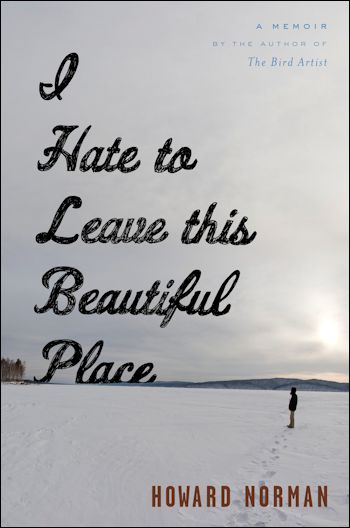Howard Norman’s readers owe a debt to both his journal- and letter-writing habits, which have aided him in bringing to life events so well that they seem tantalizingly abridged. Readers of a certain age may find themselves bemoaning lapses in their own past note-taking. In I Hate to Leave this Beautiful Place, Norman the novelist is able to draw sharp character and scenic detail that work especially well because these details play out as short stories carried in memoir form.
More than other forms, the traditional memoir is expected to follow a linear sequence. Indeed, Norman’s stories are mostly chronological. Likely most memoirs often depart from this, but the expectation is great. On the other hand, Norman makes occasional and dramatic use of jump cut. E.g.,
. . . So now I was a floor polisher.
The Cross of Lorraine tells the tragic story of the capitulation of the French Army . . .
This technique, coupled with non-chronological sequences, has the effect of keeping the reader off-guard. Readers should be off-guard as this memoir unfolds.
A single memoir, for instance, is expected to include a courtship story of a spouse or two. That expectation is dashed here, one suspects intentionally, as there is no mention of Norman’s spouse Jane Shore or daughter Emma until practically halfway through the text. One has the impression that these two are fellow travelers between the “beautiful places,” rather than the transformative presence that they more likely became.
The descriptions of place — flora and fauna, to be clear — are not always in the forefront of the storytelling, but they are thematically crucial to giving the arc of the memoir a pleasing shape. At times this gives the writing a didactic tone, albeit a gentle “you need to know this.” About the ornithological arts, the results can be unpredictable. When writing about his connection to a particular swan, or his penchant for purchasing “bird art” he can’t afford, this is engaging. When it’s on background, such as a glancing reference to an owl conference, it drifts toward nature writing. Norman is a careful writer, but he is not a science writer. He is relying on a tacit relationship between writers in the humanities and their audience: that features and forces of nature are intrinsically poetic or symbolic. I suspect most readers drawn to this memoir won’t mind, but there is so much of that in his storytelling that this assumed connection is tested repeatedly.
I woke up, put on the BBC, and stepped out onto the dirty road at five a.m. Crows calling and the scuffle of deer in the direction of the trout pond, hummingbirds at the fuchsia, Gertrude was just returning to the barn. Can you imagine what comprises an owl’s night? Already things I love most every day had happened.
It was a departure from the norm to read Beautiful Place in a single sitting. One reason was coincidental: the mentions of Jim Morrison, Joni Mitchell, rural Vermont, Western Michigan University, Lennon’s murder, Woodstock, garage bands, the multi-city continuity of NPR — most of all, Merwin’s Carrier of Ladders (1970), which I bought and read around the same time. As one who began writing on a typewriter, I recognize that the tradition of manual typewriter-wielding naturalist-writer is venerable. There is mention of Norman shopping for typewriter ribbons and working in a writer’s cabin. I did not find this anachronism endearing, though it deserves a certain respect for steadfastness of purpose. More effective was a narrative that finds a way to cite Saigyo, Denise Levertov, W.S. Merwin, Robert Frost, Paul Eluard, Louis Aragon, Hayden Carruth, Rita Dove, Rilke, W.H. Auden, Borges, spouse Jane Shore and Robert Hass.
Another reason for a single-sitting read was the crescendo of melancholy, which started early with Norman’s estrangement from his father, and moved steadily from unhappy to tragic. The last chapters of Beautiful Place try to resuscitate readers from the emotional catastrophes that ricochet through the narrative, but the pall of dread remains fixed.
I unconditionally recommend this work to the literary-minded. When Norman quotes Ryūnosuke Akutagawa (“What good is intelligence if you cannot discover a useful melancholy?”) and Nabokov (“memory perfume”) he could well be describing his own memoir. Readers will find much melancholy in his memories.
Yet somehow Norman’s world, despite his diligent ruminations, seems cramped. It pains one to say this. The places Norman has visited have been brought to life with tenderness and, in the case of the tragic circumstances in Norman’s D.C. area (one thousand book-containing) residence, agonizing. Still, so much of importance — so many places of importance — are omitted during that span of years. In fiction, this is by design. In memoir, the act of thoughtful autobiographical exposition creates an expectation of even greater perception.
What Norman writes of here are exquisite, dark little places.
Readings
Share book reviews and ratings with DV,
and even join a book club on Goodreads.


















